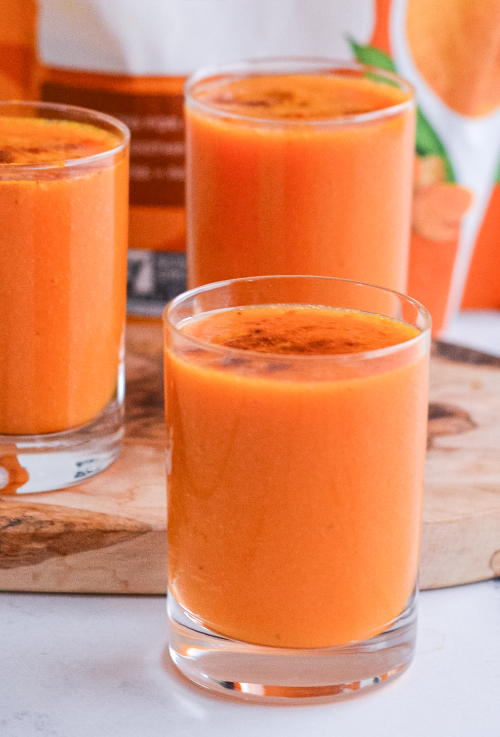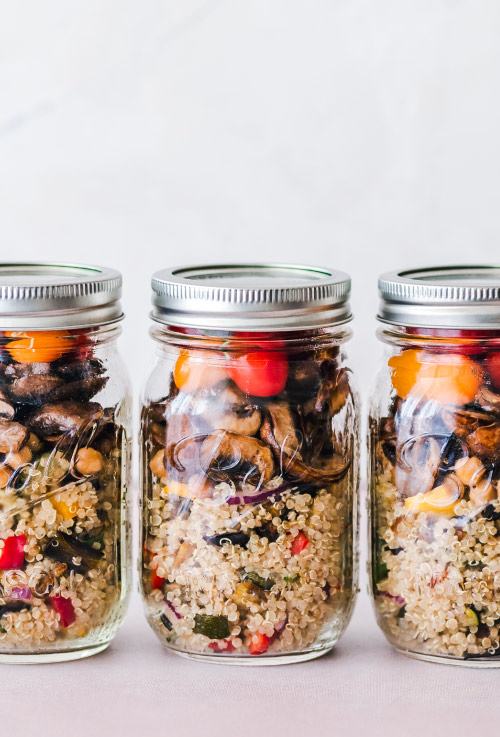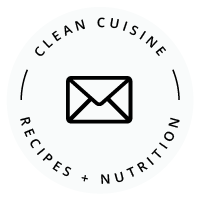
What are some good weight loss tips? This is a question I get a lot, especially because my husband is a weight loss surgeon (he’s the medical director of JFK Medical Center’s Bariatric Wellness and Surgical Institute). In fact, we just got back from the ASMBS (American Society for Metabolic and Bariatric Surgery) conference at the Aria hotel in Las Vegas.
The focus of the conference was on weight loss surgery and on presenting the latest research for overcoming obesity. Weight loss is certainly a hot topic these days and I thought the conference would be a good time to discuss weight loss and also have Andy answer a few questions on film in the video below (this was basically like pulling teeth as Andy is not at all a huge fan of my video camera!)
Anyway, weight loss tips are a dime a dozen. Google “weight loss tips” and thousands of links will pop up in a matter of seconds. You’ll get suggestions for how to exercise effectively, how to measure your food, how to count calories, how to get motivated, how to stay motivated, how to use willpower, how to go to a party and still stick to your diet, and on and on.
These suggestions are all good and great but not many suggestions address the most important thing you need to know when trying to lose weight…which is how to control hunger.
How to Control Hunger?
No matter how much willpower you have and no matter how motivated you are to lose weight, research proves hunger rules. A weight loss surgeon can give you plenty of scientific mumbo jumbo about the intricacies of bariatric surgery, but when you get down to the nitty gritty he (or she) will tell you the surgery primarily works because it curbs hunger. This is why hunger control should be at the core of any weight loss program. When patients are not hungry they don’t overeat. And they lose weight. Lots of it.
Don’t Some People Eat for Reasons Other than Hunger?
Yes! People eat for tons of reasons. They eat out of boredom, out of sadness, out of happiness, out of loneliness. Or they eat just because the food tastes good! A psychologist would certainly be much better equipped than I am to answer a question about why people eat if they aren’t hungry. A psychologist would also be able to explain “transfer addiction” and why after weight loss surgery some patients swap their “addiction” to food for an addiction to something else like gambling, alcohol or shopping. All I can tell you is that the statistics on weight loss surgery show when hunger is gone, weight loss follows.
Why Do We Get Hungry?
While it’s true some people are hungry for something other than food (which explains why “transfer addiction” can sometimes be a side effect of weight loss surgery), I am certain a psychological problem is not at the root of American obesity. The latest Gallup-Healthways Well-Being Index shows 63.1% of adults in the U.S. were either overweight or obese in 2009. More than half the country can’t possibly have a psychological problem. The primary “problem” is excessive hunger.
Why do we get so hungry? I’m going to say it’s because most of us eat nutrient-poor diets that are also not filling. In our first book, [intlink id=”2138″ type=”page”]The Gold Coast Cure[/intlink], my husband and I talked about how the modern day diet delivers an abundance of calories but not enough nutrition; lack of nutrition leads to food cravings, insatiable hunger and a sluggish metabolism. While you wouldn’t normally think of our society as being malnourished given our seemingly endless supply of readily available food, the truth is we are not properly nourished.
Malnutrition refers to improper nutrition, not necessarily inadequate calorie intake. Even though most of us get way more than enough calories to eat, we’re often getting those calories from packaged convenience foods from which essential nutrients have been stripped during processing. Therefore many of us don’t consistently get the nutrient we need to maintain healthy immune systems, prevent colds and cancer and ward off obesity.
The malnourished body is hungrier than it needs to be and it experiences unnecessary food cravings; if you are constantly hungry and fighting food cravings you are at a high risk for obesity. Even though many weight loss tips don’t focus on how to ramp up nutrient intake, the reality is good nutrition plays a very important role in weight management.
Weight loss surgery absolutely does not fix the nutrient-deficit problem described above but it does work mechanically to shrink your stomach; this makes you feel fuller on less food. Post operatively, weight loss surgery patients are significantly less hungry, they eat less food and they lose weight. The mechanism by which the surgery works is very complicated and the powerful influence the surgery has on complex appetite controlling hormones is still not fully understood. However, what is understood is that when the stomach is surgically (mechanically) made smaller then the patient feels full with less food and the brain receives “I’m full! Stop eating!” signals. The good news is, you don’t necessarily need to resort to weight loss surgery to feel full. You can simply choose to eat different foods. You can choose to follow a healthy diet plan based on clean food in it’s most natural, unrefined “whole” form.
The Top 9 Weight Loss Tips
Certainly weight loss surgery is NOT recommended nor indicated for the vast majority of overweight people. However, if you understand the mechanical mechanism by which weight loss surgery works, then you can choose foods that take up a lot of bulk and space in your stomach (mainly fiber-rich plant-based foods such as fruits, vegetables, whole grains, and beans) and therefore mimic the fullness you would otherwise feel from weight loss surgery. Interestingly, the same bulky fiber-rich “clean foods” that make you feel full also have very few calories and loads of nutrients. By eating large amounts of “whole foods” in the form of fruits, vegetables, whole grains and beans you flood your body with the nutrients it needs to stay healthy, prevent disease…and curb food cravings.
Here are the top 9 tips to follow a healthy diet plan, control hunger and lose weight without weight loss surgery (the “side benefit” to incorporating these healthy eating tips into your lifestyle is that you’ll also be protecting yourself from serious diseases.)
- Eat a HUGE raw salad everyday. The base of your salad should consist of at least 2 cups of dark leafy greens; then add any combination of raw vegetables you like. Make sure the salad dressing you use is made with oils that have not been refined. It’s best to make your own dressing using either omega-3 fats (such as flaxseed oil or hemp seed oil) or monounsaturated fats (such as extra virgin olive oil).
- Eat 2 additional large servings of vegetables everyday.
- Eat 2-3 whole fruits (avoid fruit juice).
- Eat at least 1 serving of fiber-rich beans or legumes each day.
- Calorie for calorie plant-based foods have more nutrients than animal foods. To maximize nutrition try to get more plant-based protein from whole foods such as “whole soy” (tofu, tempeh, edamame beans), nuts, seeds, beans and legumes and eat less animal foods (such as eggs, chicken, beef, pork, etc). Note: Reducing your intake of animal foods will also lower your intake of animal-based pro-inflammatory saturated fat. The animal foods you do eat should be of the absolute highest quality such as choosing grassfed beef over grain fed.
- Make sure you are getting the right ratio of omega-3 to omega-6 fats (this will help decrease inflammation and assist with weight loss). The modern American diet is way too rich in pro-inflammatory omega-6 fat and contains not nearly enough anti-inflammatory omega-3 fat. The easiest way to optimize your omega-3 / omega-6 fat ratio is to completely eliminate processed nutrient-poor omega-6 vegetable oils (such as corn, soybean, cottonseed and “pure” vegetable oils) and instead choose unrefined foods that contain a more healthful balance of omega-3 to omega-6 fats (such as flaxseeds, chia seeds/ Mila, raw walnuts, raw almonds, raw pecans, raw sunflower seeds, etc.)
- Eliminate foods containing these four empty calorie ingredients: refined sugar, trans fats, refined vegetable oils (corn oil, soybean oil, etc) and refined flour. Processed food basically consists of one or more of these ingredients, all of which are devoid of nutrients and not the least bit filling.
- Eat “real” whole grains that have not been refined. You want to eat foods like quinoa or brown rice, not a “whole grain cracker” made primarily with a bunch of junk and just a little bit of whole wheat flour. Also, swap bread made with flour—even if its “whole wheat” flour —for sprouted whole grain bread (the process of sprouting releases all the vital nutrients stored within in whole grains.)
- Strength train. Ok, so this doesn’t have anything to do with food. But, strength training will build lean muscle mass and the more lean muscle you have the better your body will be at handling glucose, which means the less “fat-storing” insulin your body will produce after your meals. Strength training will absolutely help you lose body fat and make weight loss much easier.








Charles
Tuesday 14th of September 2010
Great Post, may I use on my blog?